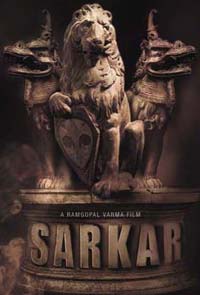
"Sarkar" means "government," so it's no surprise that the trailers to Ram Gopal Varma's latest gangster film (along with the image above) allude directly to politics. With taglines like "There is no good and evil, only power," and "When the system fails, a power will rise..." Varma is marketing a gangster film that seems to be channeling
Nietzsche.
He also wants to remind you that he's perfectly aware of the fact that he's ripping off
The Godfather, so he takes the rather unusual measure of announcing it at the opening of the film with another on-screen quote: "This is my tribute to
The Godfather" (as if Varma has done anything but that since
Satya!). Still, this film is unusual because it is explicitly a double-adaptation, blending two mythic backgrounds into one image of absolute power. "Sarkar" is played, of course, by Amitabh Bachchan, here even more impassive and bloated than he is in the other fifteen films in which we've already seen him this year.
Sarkar is really not a very great film (last year's Indian gangster movies were better, especially
Maqbool, an adaptation of
Macbeth, and
Ab Tak Chappan), though Varma's double-adaptation plays interesting games with its sources, including the career of the real life political figure it is (loosely) about,
Bal Thackeray, as well as of course the Corleone family in
The Godfather.
The Fantasy of Absolute Power in an era of confusing democracyFirst of all, why is Puzo's idea of Vito Corleone so attractive? Corleone is a civilized gangster, to whom loyalty must nevertheless be absolute. He is a family man, with strong, almost indissoluble, blood ties -- but who makes exceptions to add in people who are either not family or not Sicilian (i.e., Tom Hagen, "Consiglieri"). The Godfather is, in short, an iconic patriarch, whose absolute honor, loyalty, and authority is the hallmark of his effectiveness as a leader. He's a superman, a savior, and the paragon of capitalism: Jesus Christ in a tux, stepping out of a stretch limo.
People fantasize about such figures when more modern modes of doing business or politics seem to be leading nowhere, when the vagaries of the political process lead to a disputatious and demoralized public.
In the 1970s and early 80s, this was undeniably the case in
both India and the United States. It's no accident that
The Godfather was released as a film in 1972, after 8 years of indecisive leadership over the war Vietnam and the direction of American democracy. With Vito Corleone and his war-veteran son Michael (though it was an earlier war, the parallel is not an accident), there is no protracted war for control of the mafia -- no pathetic "peace with dignity." Everything is decided via a show of overwhelming force, which requires that the Son, Michael, murder all enemies at once, including his own brother.
A similar failure of governance opened the way to the emergence of the Shiv Sena in Bombay, led by Bal Thackeray. With Bal Thackeray, there were no pieties about reform, inter-ethnic harmony, or Nehruvian secularism. There were just decisions: caps on non-Marathis in city government, restrictions on non-Marathis getting government contracts, Marathi as the official language, the renaming of everything, and so on and so on. The big difference between Thackeray's political power and a gangster's power -- a distinction Varma ignores in the film -- is that Thackeray's power was always strongly supported by millions of working class and lower-middle class Marathis.
Thackeray's populism was also tied to the event for which his actions cannot be forgiven or simply 'understood' as doing what a political Boss Has To Do to stay on top in Bombay. I'm referring of course to Thackeray's well-documented role in fomenting the riots of 1992. Varma's attempt at making a slick gangster movie has no space for this aspect of Thackeray's evil, and in fact reverses it by throwing in a plot involving a Muslim terrorist smuggling in bombs from Dubai (who is in league, improbably, with an evil, cigarette-smoking "Swami" who is out to get Sarkar). It is a truly perverse rendition of reality to take a man involved in the deaths of thousands of innocent people and turn him into a vigilante fighter of terrorism, as Varma does in
Sarkar.
Fortunately, Bal Thackeray is on his last legs, and his political machine is faltering. His son
Uddhav is no Michael Corleone -- more like Puzo's "Fredo" (soon to be exiled to Vegas) Without Bal Thackeray's charismatic presence, it's questionable whether the Shiv Sena will continue to be a force in Mumbai in the next political cycle.
(Incidentally, there is an interesting controversy about the Dubai terrorism plot in the film, which has led the film to be banned in the UAE. See
this)
* * *
Anti-feminismThe other defining event playing into the myth of
The Godfather was the rise of feminism, which good Godfathers naturally dismiss with a gesture ("we don't discuss business in front of the women"). Threatening the code of masculine power, in
The Godfather Puzo has Vito's son Michael go off to college, where he marries a WASP girlfriend ("Kay") with modern ideas. Michael is sympathetic to feminism and modernity, and frustrated with his family's backwardness, though he eventually dismisses all of it too at the end of the story (brilliantly filmed by Coppola: Michael closes the door on a bewildered and terrified Kay, to discuss Family Business with his father's henchmen).
Some of that anti-feminism is also at play in
Sarkar, though here the 'outside' influence is America.
Katrina Kaif (with markedly 'Anglo' features; see my
post on Parineeta) plays the NRI girlfriend who simply doesn't understand the ways of the Family. What Varma does with this is pretty formulaic: the hero rejecting the 'modern girl' in favor of the 'traditional Indian wife' (here played by Kajol's sister Tanisha!) is a universal theme in Bollywood films.
* * *
Character actorsRam Gopal Varma has always good at finding memorable character actors -- people like
Rajpal Yadav (the bumbling anti-hero in
Mein Madhuri Dixit Banna Chahti Hoon, and a ubiquitous 'comic relief' presence otherwise), as well as many idiosynratic gangsters. Here we have "Silver Mani," a stuttering Tamilian (an odd choice for an ally for Sarkar, considering the Shiv Sena's notorious anti-South Indian rhetoric in the 1970s). Also quite memorable in
Sarkar is the glowering "Chander," whose role as Sarkar's enforcer is similar to the "Luca Brasi" character in
The Godfather. Tough as steel.
Also great is the 'evil Swami' character, complete with huge glasses, crazy hair, and the afore-mentioned cigarette. Where does he get these guys?
* * *
The Bachchan factorAmitabh Bachchan is incredibly boring to watch. Varma spends endless hours with close-ups on his star, which go absolutely nowhere. Actors like Brando and Pacino use this blank space and fill it with power -- a hint of menace, the snarl of contempt -- but Bachchan simply seems to be staring off into space, looking vaguely constipated. Fast-forward, yaar. Please fast-forward.
Abhishek is a little better. As with
Yuva, he has an interesting darkness about him that differentiates him from the current generation of bland male stars (i.e., the ultra-bland Saif Ali Khan). That darkness is emblematized by his beard, which has generally been considered taboo for lead actors in Bollywood. Bearded, snarling Abhishek was interesting in
Yuva, where he had a pronounced vulnerability that had to do with class resentment and insecurity. But this is a smaller role and a lesser film, and that edgy potential isn't doing much here. It won't be long before Abhishek is cast in thousands upon thousands of crap roles like his father (and probably the beard will not last long).
Ah well. There is still hope is for the character actors -- the 'sideys' -- of whom I can never get enough. (Rewind!) Ramu-bhai, please give us more cigarette smoking swamis with sinister smiles. I've had enough of these tired Bollywood stars.
(Ok, wishful thinking. I'm sure I'll be back at the
Indian multiplex in North Bergen in a week or two...)
UPDATE: Thanks to Aswin for the link to the
Frontline article by Uma Dasgupta about Ram Gopal Varma's gangster trilogy.
Since posting, I also came across (via Feedster) an interesting article by
Sudhish Kamath (from an article published in The Hindu, I believe), comparing The Godfather to Sarkar, with additional reference to Mani Ratnam's Tamil adaptation,
Nayakan. Pretty good reading.




